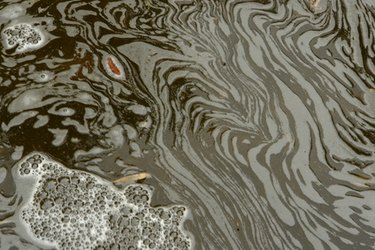
People use detergents so often that they take them for granted, but synthetic detergents only became widely available in the 1940s . Before then, people relied on ordinary soaps to clean items and remove stains. Common soap was an unsatisfactory product because it left a soap film and did not remove oily dirt well. Today, detergents are used in an infinite variety of commercial products. Modern society depends on the chemical action of detergent, particularly for its effect on oil.
What Is Detergent?
Video of the Day
Detergent is a combination of ingredients, such as surfactants, plasticizers, binders, lather enhancers, fragrance, dyes and other compounds, mixed with water. Generally, the surfactants make up the highest percentage. According to ChemistryExplained, surfactants have a dual purpose, first binding to dirt and oil and allowing them to be dispersed in water and washed away. This allows better cleaning and more thorough rinsing. Other chemicals in detergent make products more pleasant or convenient to use for a variety of specific purposes.
Video of the Day
How Detergent Works
The surfactant in detergents has a "lipophilic" end, that is, a part that is attracted to oily dirt, and a "hydrophilic" end that is attracted and binds to water. These two forces work together to first break up the dirt and oils on items, and then put them into solution in the water. The water, which is now holding the oily dirt, is then easily washed away.
Detergents and Oil
This ability to both bind to and carry away oil is used in many different commercial, industrial and environmental areas to both clean materials and provide better mechanical function. Detergent oils used in automobiles clean the engine parts of surface contaminants, allowing them to be filtered out of the engine for better performance. Industries of various types use detergents to remove oil from parts after forming, stamping and machining processes. Metal manufacturers often use oil to protect parts against corrosion during manufacturing and transportation which must then be removed before going to the consumer. Of course, detergents are also used in households every day to clean homes, clothing, appliances and utensils.
Detergent and Environmental Cleanup
Recently, newspapers have reported the extensive use of detergent products for environmental cleanup. According to MotherNatureNetwork, the International Bird Rescue Research Network used dishwashing detergent to remove oil from birds during many of the recent oil spills. The detergent suspended the oil into the water so that it would wash off the birds' feathers. The surfactants break the surface tension of the water, allowing it to mix with the oil. This type of detergent is mild enough to avoid harmful effects on the feathers and skin of the birds.